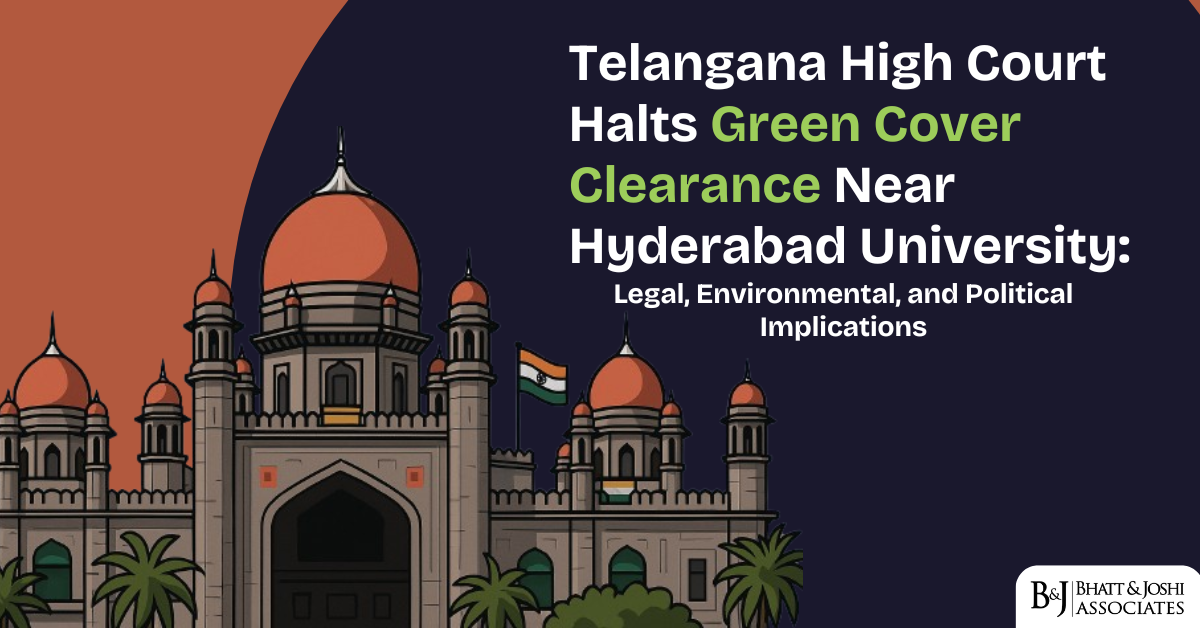Telangana High Court Stay Order on Green Cover Clearance Near Hyderabad University: Legal, Environmental, and Political Implications
By Adv. Aaditya Bhatt

Introduction
The Telangana High Court Stay Order on Green Cover Clearance, issued on April 2, 2025, has triggered a nationwide debate over how India should balance rapid urban development with ecological preservation. The interim order halted the clearing of 400 acres near Hyderabad Central University (HCU), an area of significant environmental value. This article examines the legal framework, environmental stakes, and political dynamics shaping this high-stakes conflict.
Legal Framework and Ownership Dispute
Historical Context of Land Allocation
The contested 400-acre parcel in Kancha Gachibowli is part of a larger 2,324-acre tract allocated to HCU in 1975. While the university claims historical custodianship, the Telangana High Court ruled in 2022 that no legal deed transferred ownership to HCU, a decision later upheld by the Supreme Court. The state government asserts the land was lawfully transferred to IMG Bharata Academies in 2004 for industrial use.
Forest Conservation Laws in Focus
Environmental petitioners, led by the Vata Foundation, argue the area qualifies as a “deemed forest” under the Supreme Court’s 1996 Godavarman judgment, which expanded the Forest Conservation Act’s scope beyond officially recorded forests. They allege violations of:
- Forest Conservation Act 1980: Mandates central approval for deforestation.
- Water, Land, and Trees Act (WALTA): Restricts tree felling without permits.
The 2023 Forest Conservation Amendment Act complicates matters by exempting certain lands near borders and infrastructure projects from protection. Critics argue this weakens safeguards, a concern amplified by the Supreme Court’s recent interim order against forest loss.
Ecological Significance and Environmental Impact
Biodiversity Hotspot Under Threat
The disputed land hosts 237 bird species, spotted deer, wild boars, and unique rock formations. Environmentalists warn that clearing it would:
- Disrupt watersheds feeding local lakes.
- Destroy habitats for endangered species.
- Eliminate carbon sinks critical for Hyderabad’s climate resilience.
Centre’s Action to Stop Tree Cutting
The Union Environment Ministry directed Telangana to submit a factual report by April 3, 2025, and initiate legal action against unauthorized tree felling under the Wildlife Protection Act. This intervention underscores the site’s national ecological importance.
Political Debate over Green Cover Clearance in Hyderabad
Opposition vs Government Narratives
Bharat Rashtra Samithi (BRS): Accuses the Congress-led government of “green murder,” alleging the IT park project bypassed mandatory Environmental Impact Assessments. Former Deputy CM K.T. Rama Rao criticized Rahul Gandhi’s silence, framing the issue as hypocrisy in environmental stewardship.
Congress Defense: Claims the land was legally acquired from a private entity post-Supreme Court validation. It accuses opponents of politicizing development essential for job creation.
University’s Contradictory Stance
HCU Registrar Devesh Nigam rejected the state’s survey demarcation, urging reconsideration of the land’s ecological value. However, the institution’s lack of legal ownership weakens its standing.
Judicial Proceedings and Next Steps
High Court’s Interim Order
Acting Chief Justice Sujoy Paul’s bench halted all activities until April 3, emphasizing the precautionary principle in environmental law. The court will assess:
- Compliance with forest laws.
- Validity of “deemed forest” claims.
- Political interference allegations.
Supreme Court Precedents
The ruling in State of Telangana vs Mohd. Abdul Qasim (2024) emphasized prioritizing tribal rights and ecological integrity over state development agendas, a likely reference point in this case.
Conclusion: A Watershed Moment for Urban Conservation
The Kancha Gachibowli dispute captures the larger struggle of balancing urban growth with ecological responsibility. The Telangana High Court Stay Order on Green Cover Clearance has pushed this issue into the national spotlight, raising important questions about how development projects are planned and approved.
Key takeaways include:
-
Legal Precedent: The verdict could redefine what qualifies as a “forest” under the 2023 Forest Conservation Amendment Act, shaping future land-use cases.
-
Environmental Oversight: The Centre’s involvement reflects growing pressure to hold state authorities accountable for protecting sensitive green zones.
-
Political Transparency: As BRS and Congress trade barbs, the case reveals how environmental decisions are too often caught in political crossfire.
As hearings resume, all eyes remain on whether judicial intervention can forge a path where IT corridors coexist with biodiversity corridors—a critical blueprint for India’s climate-vulnerable cities.
 Whatsapp
Whatsapp

